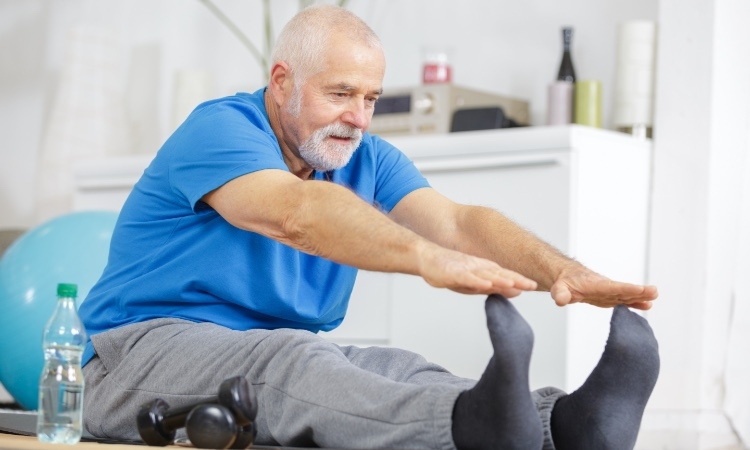
Parkinson’s and the Benefits of Exercise
By CarePatrol of Baltimore
A chronic and progressive movement disorder, usually associated with aging individuals, Parkinson’s is not currently curable, but it is treatable, and many people go on living productively with managing the disease. One of the most important and effective treatments is exercise.
Parkinson’s effects how you move, and exercise helps keep you moving. Walking, swimming, cycling, whatever you enjoy doing that is active, is beneficial. Come up with a plan with your care team, one that is suited to your interests and fitness level and make it a priority in your treatment. Consider an exercise “prescription” as designed with a physical therapist, to get you started and to focus on the areas you need the most attention. 1 Parkinson’s effects individuals differently so understanding your symptoms is an important step to creating an exercise plan that best meets your needs.
For Parkinson’s complications such as slowness and stiffness, feeling weak, and cognitive problems, exercising is a good solution. Exercise helps with overall balance and coordination and helps build strength and stamina. This is important for everyone but especially important for people with Parkinson’s because these are areas that are compromised by the disease. The level of compromise varies from person to person. Research has shown that exercise can have a restorative effect, helping to slow the progression of the disease and improve overall balance and coordination.
In people with PD, exercise training not only improves their muscle strength and function, it has additional benefits as well:
- Reduced shaking, improving movement (helping with slow movement), and balance
- Enhances the efficacy of levodopa therapy, the primary treatment for Parkinson’s
- Improves heart and lung capacity – which supports stamina
- Improves endurance – through enhanced strength and stamina
- Improves gait disturbances
- Improves cognitive function
- Improves quality of life 2
Certain types of exercise are particularly beneficial – some doing what medications cannot. In a podcast with the Michael J. Fox Foundation, Dr. Lisa Shulman, movement disorder specialist and professor of Neurology at University of Maryland, discusses the benefits of exercise as a treatment for Parkinson’s. Especially when there are issues of mobility – exercise has a good capacity to relieve symptoms. Research is finding that many different approaches are effective. One size doesn’t fit all. Aerobic exercise impacts endurance. Weight training impacts strength. Dance or yoga impacts flexibility and balance.
It has been discovered that exercise can improve symptoms that no pill can: treadmill training has a direct affect on how fast you are able to walk and how far, how long, and improves gait. Gait improvement is a significant area where medications simply don’t work. Similarly, it was discovered that individuals who practiced Tai -Chi improved balance, an area that is hard to improve with medication, but improves with exercise.
Improved mood or reduction in fatigue are other good benefits to exercise when you have Parkinson’s. Exercise is a social outlet, it has emotional benefits, which is more difficult to research, and we can’t measure definitively the brains of people with Parkinson’s who are exercising. We don’t know if it’s changing the underlying biological progression of the disease. But we do know that it is having an impact.
Can we delay the trajectory of the disease? In Dr. Shulman’s opinion, yes – and that’s adding years of quality of life to people who have Parkinson’s. 3
References:
1 “Exercise”, The Michael J Fox Foundation for Parkinson’s Research. https://www.michaeljfox.org/news/exercise
2 “What is the Role of Exercise with Parkinson’s Disease?” ParkinsonsDisease.net; Health Union https://parkinsonsdisease.net/treatment/exercise/
3. Shulman, Dr. Lisa, “Podcast: How Can Exercise Help Manage Parkinson’s,” The Michael J Fox Foundation for Parkinson’s Research. https://www.michaeljfox.org/podcast/podcast-how-can-exercise-help-manage-parkinsons